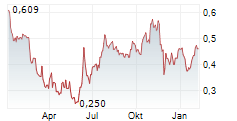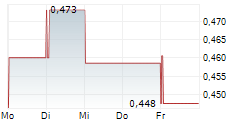- Positive topline results demonstrate a statistically significant (p=0.034) difference in the rate of change in serum T3 in patients randomized to withdrawal (placebo) vs. in patients continuing therapy (tiratricol)
- The ReTRIACt study is the last study to be reported for Emcitate® (tiratricol) in MCT8 deficiency and complement the EMC Survival Study and other clinical data for the New Drug Application (NDA), as discussed with the FDA in the October 2025 pre-NDA meeting
- A rolling NDA submission is planned to commence in December 2025, targeting a complete NDA submission in early 2026 and anticipated completion of the FDA review process in Q3 2026, if Priority Review is granted
- Conference call for analysts and investors to be held today at 10:00am CET. Further details below
Stockholm, Sweden, November 14, 2025. Egetis Therapeutics AB (publ) ("Egetis" or the "Company") (Nasdaq Stockholm: EGTX), today announced positive topline results from the ReTRIACt study of Emcitate® (tiratricol) in patients with MCT8 deficiency.
The ReTRIACt study (clinicaltrials.gov identifier NCT05579327) is a double-blind, multicenter, placebo-controlled, randomized, withdrawal study in patients with MCT8 deficiency. Males 4 years of age and above who demonstrated stable maintenance treatment with tiratricol, were randomized to continue tiratricol or receive placebo for 30 days or until reaching the rescue criterion (serum total triiodothyronine [T3] > upper limit of normal [ULN]).
As a result of the pre-NDA meeting Egetis held with the FDA in October 2025, on the back of the Breakthrough Therapy Designation granted in July 2025, FDA agreed that in the NDA submission, data from the ReTRIACt study will complement the existing data from the EMC Survival Study and other clinical components. Furthermore, based on comments from the FDA, the Statistical Analysis Plan (SAP) of the ReTRIACt study was revised, and the study was closed. A Primary Endpoint 1 (PE1), evaluating rate of change in serum total T3 during the double-blind Randomized Treatment Period, was added to the previously described Primary Endpoint 2 (PE2), based on the T3 rescue criterion. Type I Error is controlled via alpha recycling, testing PE1 first, and if PE1 is met, PE2 will then be tested.
The Primary Endpoint 1 (PE1), rate of change in serum T3 during the Randomized Treatment Period, showed a statistically significant difference between placebo and tiratricol (ratio of T3 rate of change (placebo/tiratricol): 1.494 [95% CI: 1.035; 2.155]; p=0.034). The results show a complete separation of the two groups with all 8 patients randomized to placebo having an increase in serum T3 during the randomized treatment period (range: 0.49 - 2.08 nmol/L), larger than all 7 patients randomized to continue tiratricol (range: -0.24 - 0.40 nmol/L). In the placebo group, 4 patients met the rescue criterion during the randomized treatment period compared to 0 patients randomized to tiratricol (p=0.070 on observed cases of rescue). One patient randomized to tiratricol discontinued (not drug related) during the randomized treatment period, which per the SAP was imputed as rescue in PE2, leading to a 4 (placebo) versus 1 (tiratricol) comparison for PE2 (p=0.182). All patients randomized to placebo showed an expected decrease in serum T3 levels following reinitiation of tiratricol in the follow-up period.
In line with the outcome of the pre-NDA meeting with the FDA in October 2025, Egetis plans to submit an NDA for Emcitate® (tiratricol) with currently available clinical data in patients with MCT8 deficiency, including data from Triac Trial I, Triac Trial II, ReTRIACt, EMC Cohort Study, EMC Survival Study and the US Expanded Access Program. The rolling submission will commence with the initial submission in December 2025, targeting a complete NDA submission in early 2026 and anticipated completion of the FDA review process in Q3 2026, if Priority Review is granted. As Emcitate® (tiratricol) has Breakthrough Therapy Designation, Egetis will request a priority review. Emcitate® (tiratricol) also holds Orphan Drug Designation, Fast Track Designation and Rare Pediatric Disease Designation in the US. Emcitate® (tiratricol) was approved in the EU in February 2025 and launched in Germany in May 2025. Emcitate® (tiratricol) is not approved for use in the United States.
Nicklas Westerholm, CEO of Egetis, commented: "We are delighted with the positive topline results for the ReTRIACt study and plan to initiate a rolling NDA submission in December 2025, targeting a complete NDA submission in early 2026. We look forward to bringing this potential treatment to patients in the United States as soon as possible. Tiratricol treatment for MCT8-deficiency is already included in clinical guidelines by the European Thyroid Association and Emcitate® (tiratricol) was approved for the treatment for MCT8 deficiency in the European Union in February 2025.
"We are grateful to the patients, their families, and the investigators who have participated in the ReTRIACt study."
The results will be presented at a forthcoming scientific meeting, submitted to a peer-reviewed medical journal and shared with regulatory authorities.
Information about webcast
If you wish to participate via webcast please use the link below. Via the webcast you are able to ask written questions.
https://egetis.events.inderes.com/webcast-nov-14-2025
If you wish to participate via teleconference please register on the link below. After registration you will be provided phone numbers and a conference ID to access the conference. You can ask questions verbally via the teleconference.
https://events.inderes.com/egetis/webcast-nov-14-2025/dial-in
For further information, please contact:
Nicklas Westerholm, CEO
+46 (0) 733 542 062
nicklas.westerholm@egetis.com
Karl Hård, Head of Investor Relations & Business Development
+46 (0) 733 011 944
karl.hard@egetis.com
This information is information that Egetis Therapeutics is obliged to make public pursuant to the EU Market Abuse Regulation. The information was submitted for publication, through the agency of the contact persons set out above, at 2025-11-14 07:00 CET.
About MCT8 Deficiency
Monocarboxylate transporter 8 (MCT8) deficiency is a rare genetic disease with high unmet medical need. Thyroid hormone is crucial for the development and metabolic state of virtually all tissues. Thyroid hormone transport across the plasma membrane is required for the hormone's metabolism and intracellular action and is facilitated by thyroid hormone transporters, including MCT8. Mutations in the gene for MCT8, located on the X-chromosome, cause MCT8 deficiency, also called Allan-Herndon-Dudley syndrome (AHDS) in affected males. The resulting dysfunction of MCT8 leads to impaired transport of thyroid hormone into certain cells and across the blood-brain-barrier and disruption of normal thyroid hormone regulation. This leads to a complex pattern of symptoms with neurological developmental delay and intellectual disability, accompanied by strongly elevated circulating thyroid hormone concentrations which are toxic for tissues including the heart, muscle, liver and kidney and results in symptoms such as failure to thrive, cardiovascular stress, insomnia and muscle wasting. Most patients will never develop the ability to walk or even sit independently.
For further information, please see www.mct8deficiency.com
The European Commission has approved Emcitate® (tiratricol) for the treatment of peripheral thyrotoxicosis in patients with monocarboxylate transporter 8 (MCT8) deficiency (Allan-Herndon-Dudley syndrome), from birth. Emcitate® (tiratricol) is not approved for use in the United States.
About Egetis Therapeutics
Egetis Therapeutics is an innovative and integrated pharmaceutical company, focusing on projects in late-stage development for commercialization for treatments of serious diseases with significant unmet medical needs in the orphan drug segment.
The Company's lead drug candidate Emcitate® (tiratricol) is under development for the treatment of patients with monocarboxylate transporter 8 (MCT8) deficiency, a highly debilitating rare disease with no available treatment. In February 2025 the European Commission approved Emcitate® as the first and only treatment for MCT8 deficiency in EU. Egetis initiated the launch of Emcitate® in Germany on May 1, 2025.
The Company has agreed with the FDA to submit a rolling NDA for Emcitate® (tiratricol), commencing in December 2025 targeting a complete NDA submission in early 2026 and completion of FDA's review process in the third quarter of 2026.
Based on feedback from the FDA, the NDA for Emcitate® (tiratricol) for treatment of MCT8 deficiency will be based on currently available clinical data from Triac Trial I, Triac Trial II, ReTRIACt, EMC Cohort Study, EMC Survival Study and the US Expanded Access Program.
Tiratricol holds Orphan Drug Designation (ODD) for MCT8 deficiency and resistance to thyroid hormone beta (RTH-beta) in the US and the EU. MCT8 deficiency and RTH-beta are two distinct indications, with no overlap in patient populations. Tiratricol has been granted Breakthrough Therapy Designation and Rare Pediatric Disease Designation (RPDD) by the FDA, which gives Egetis the opportunity to receive a Priority Review Voucher (PRV) in the US, after approval.
The drug candidate Aladote® (calmangafodipir) is a first in class drug candidate developed to reduce the risk of acute liver injury associated with paracetamol (acetaminophen) overdose. A proof of principle study has been successfully completed. The design of a pivotal Phase IIb/III study (Albatross), with the purpose of applying for market approval in the US and Europe, has been finalized following interactions with the FDA, EMA and MHRA. The development program for Aladote® has been parked until Emcitate® marketing authorization submissions for MCT8 deficiency have been completed. Aladote® has been granted ODD in the US and in the EU.
Egetis Therapeutics is listed on the Nasdaq Stockholm main market (Nasdaq Stockholm: EGTX).
For more information, see www.egetis.com



